
Developing Ethical and Responsible Tourism Business Models for Emerging Markets
In today’s globalized world, the tourism industry plays a vital role in economic development, cultural exchange, and environmental conservation. However, the rapid growth of tourism in emerging markets has also raised concerns about issues such as overtourism, environmental degradation, and exploitation of local communities. To address these challenges, it is crucial for businesses operating in emerging markets to develop ethical and responsible tourism business models that prioritize sustainable practices and positive impacts on local stakeholders. Here are some key strategies for developing such business models:
Embracing Sustainable Practices
- Community Engagement: Engage with local communities and stakeholders to understand their needs, concerns, and aspirations. Collaborate with community members in the planning and decision-making processes to ensure that tourism initiatives benefit the local population and respect their cultural heritage.
- Environmental Conservation: Implement eco-friendly practices to minimize the carbon footprint and environmental impact of tourism operations. Reduce single-use plastics, promote energy efficiency, and





